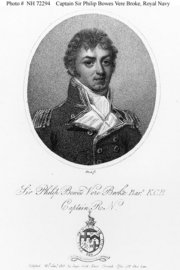November 11, 2006
Gratuitous Royal Navy Geekery Posting - Now With Bonus Pedantry!

Captain Sir Philip Bowes Vere Broke, Royal Navy (1776-1841).
Stipple engraving by Blood, published in the "Naval Chronicle", Volume 33, London, 1815.
I have resisted the urge to crack my new copy of Ian Toll's Six Frigates: The Epic History of the Founding of the U.S. Navy, having promised myself to first tackle several other books already waiting in the queue. However, I happened to be flipping through the pictures set out after p. 304 this morning and came across the following caption:
Commodore Philip Broke, HMS Shannon, leads boarders onto the deck of USS Chesapeake, June 1, 1813.
Of course, this was a famous battle and naturally would be included in Toll's book. However, the caption is incorrect. Broke was not a Commodore at the time but a Post Captain. Indeed, there was no such rank of "Commodore" in the Royal Navy, the title being a temporary one reserved for the commanders of small, detached squadrons sailing independantly of any commanding Admiral. (This was important for, among other things, calculation of the distribution of prize money.)
Broke and the Shannon were attached to the North American Squadron based at Halifax. In 1813, that squadron was under the command of Admiral Sir John Warren. Therefore, the caption should read, "Captain Philip Broke...."
I sincerely hope that when the next edition of the book comes out, it will include a correction on this point.
UPDATE: By the bye, as I was nosing about for the name of the Admiral commanding the North American Squadron (whom I eventually tracked down in Teddy Roosevelt's history of the War of 1812), I stumbled across this: Frigates And Foremasts: The North American Squadron In Nova Scotia Waters, 1745–1815 by Julian Gwyn.
Of course I'm going to have to buy it now.
Posted by Robert at November 11, 2006 09:51 AM | TrackBackActually, Broke was a Commodore. He had sent away his consorts (forgot names of ships) in order to lure the Americans out of Boston. You are correct that commodore was a temporary rank, but it is one that Broke held, and also, there is no reason why a captain serving under an Admiral (all did, ultimately) could not also be a commodore. Toll got it right.
Posted by: roger at November 12, 2006 08:31 PMYes, Broke famously sent away his consort, but that does not make him a Commodore. Rayther, he was simply the senior Captain among the ships tasked with blockading Boston Harbor.
Also, it is not correct that all Captains ultimately served directly under Admirals - Captains appointed as Commodores received their orders directly from the Admiralty in London, not from Admirals on station.
Posted by: Robbo the LB at November 12, 2006 10:33 PMThank you!
http://yrkfyqwt.com/nsxm/bnbw.html | http://serkdlqu.com/bfdy/hsie.html


 Image courtesy of the lovely and talented
Image courtesy of the lovely and talented 